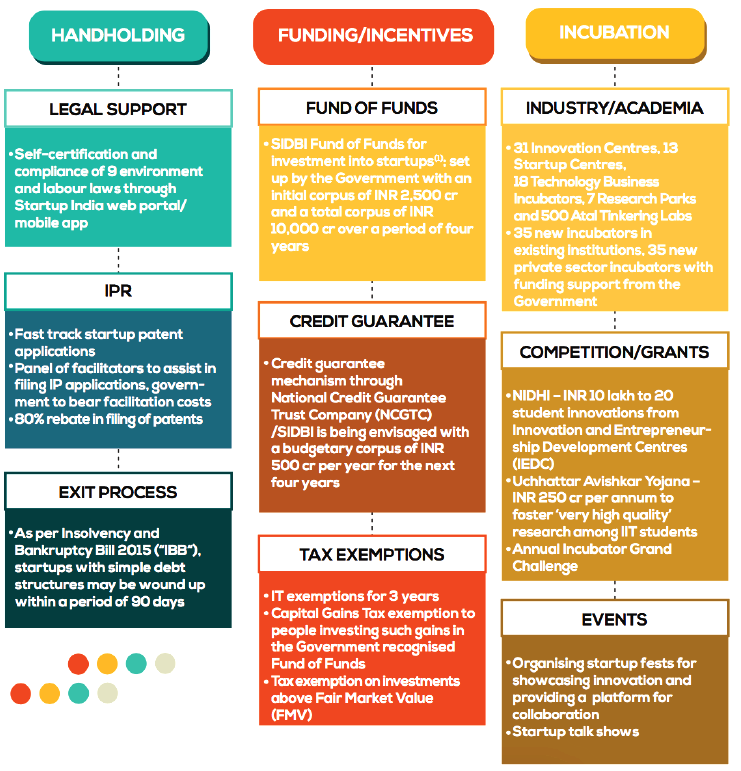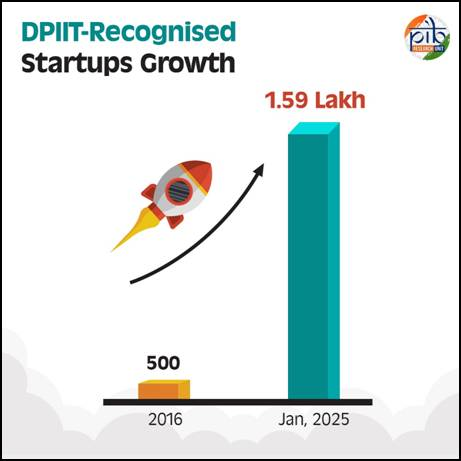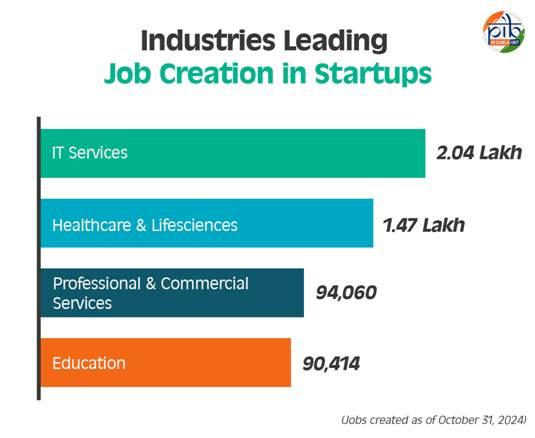Indian Economy
9th Anniversary of Startup India Initiative
- 23 Jan 2025
- 10 min read
For Prelims: India's startup ecosystem, Startup India, Artificial Intelligence, Reserve Bank of India, Corporate Venture Capital, Fund of Funds for Startups, National Research Foundation , SAMRIDH (Startup Accelerator of MeitY for Product Innovation, Development, and Growth.
For Mains: Achievements under Start-up India Mission, Current Growth Drivers of India’s Startup Ecosystem, Key Issues Related to India’s Startup Ecosystem, Way Forward
Why in News?
16th January 2025 marked the 9 years of completion of Startup India Scheme since it was launched on 16th January 2016.
- This day has been recognized as National Startup Day. Startup India initiative aims to cultivate innovation, support startups, and stimulate investments.
What is the Startup India Initiative?
- About:
- The Startup India initiative is a government program launched in 2016 that supports entrepreneurs and startups in India.
- The goal of the initiative is to create a strong ecosystem for innovation and entrepreneurship that will drive economic growth and employment by supporting startups through measures such as tax benefits, easier compliance, and access to funding.
- Flagship Schemes under Startup India:
- Fund of Funds for Startups (FFS): A Rs 10,000 crore fund to provide early-stage funding support.
- Startup India Seed Fund Scheme (SISFS): SISFS offers financial assistance to startups for proof of concept, prototype development, and product trials.
- Credit Guarantee Scheme for Startups (CGSS): CGSS facilitates collateral-free loans to startups to ensure access to credit.
- Startup Intellectual Property Protection (SIPP): SIPP provides startups with assistance in patent filing, trademark registration, and Intellectual Property Rights (IPRs) protection at reduced costs.
- Key Features:
- Startup Recognition: Streamlined registration and eligibility criteria.
- Ease of Doing Business: Simplified compliance, self-certification, and single-window clearances reduce bureaucratic hurdles for startups.
- Tax Benefits: Eligible startups receive tax exemptions on profits for 3 consecutive financial years, encouraging profitability and growth.
- Sector-Specific Policies: Targeted initiatives in sectors like biotechnology, agriculture, and renewable energy drive focused development and innovation.
- Capacity Building: The Startup India Hub serves as a one-stop platform connecting startups with mentors, investors, and industry experts, while mentorship programs offer guidance and training to enhance entrepreneurial skills and business acumen.
What are the Key Achievements Under Startup India Initiative?
- Increase in Startups: The DPIIT- recognized startups increased from 500 (2016) to 1.59 lakh (2025).
- Startup Ecosystem: India is now the 3rd largest startup ecosystem globally, after the US and China, with over 100 unicorns (startups valued over USD 1 billion).
- Employment Generation: By October 2024, startups have created 16.6 lakh direct jobs, with key sectors like IT Services (2.04 lakh) and Healthcare & Lifesciences (1.47 lakh).
- Rise of Women Entrepreneurs: As of 2024, 73,151 startups have at least one woman director, reflecting the increasing participation of women in entrepreneurship.
- Focus on Non-Metro Cities: Programs like the States’ Startup Ranking and capacity-building workshops have strengthened startup ecosystems in non-metro cities.
What are the Other Significant Initiatives Under Startup India?
- Ecosystem Development Events: Startup Mahakumbh is a national event that showcases India’s entrepreneurial spirit and innovation.
- The first edition in 2024 attracted over 48,000 visitors and 392 speakers. The second edition (April 2025), will focus on "Startup India @ 2047-Unfolding the Bharat Story," highlighting India’s future as a global innovation hub.
- ASCEND (Accelerating Startup Calibre and Entrepreneurial Drive) workshops support entrepreneurs in North Eastern States, and the Startup India Innovation Week celebrates entrepreneurship during National Startup Day.
- International Exposure: India’s G20 Presidency institutionalized the Startup20 Engagement Group to facilitate global collaboration.
- BHASKAR: BHASKAR (Bharat Startup Knowledge Access Registry), launched in 2024 is a one-stop digital platform where diverse startup ecosystem stakeholders like investors, mentors, service providers, and government bodies can seamlessly connect and collaborate.
- It offers centralized resources for scaling startups, personalized BHASKAR IDs for streamlined interactions, and an advanced search feature for better discoverability of opportunities.
- The platform also promotes India as a global innovation hub and empowers startups from non-metro regions by fostering inclusivity and regional growth.
What are the Challenges to the Startup Ecosystem in India?
- Access to Capital: Despite initiatives, many startups struggle with securing adequate funding, especially in Tier-II and Tier-III cities.
- In August 2024, funding in Tier-II and Tier-III cities dropped to Rs 630 crore from Rs 2,202 crore in July 2024, and further to Rs 202 crore in November 2024 from Rs 1,743 crore in October 2024, highlighting disparities with Tier-I cities.
- Regulatory Hurdles: India's complex and ambiguous regulatory environment poses significant challenges for startups. For instance, the debate over categorizing app-based cab services like Ola and Uber under the Motor Vehicles Act has created operational uncertainties.
- Additionally, the new Digital Personal Data Protection Act, 2024, while necessary, increases compliance burdens on startups.
- Scaling Challenges: According to studies, despite strong growth, around 90% of startups fail within the first 5 years primarily due to issues related to scaling, operational inefficiencies and challenges in entering new markets.
- Sustainability Issues: Several sectors in India's startup ecosystem, including edtech, are witnessing increasing competition, leading to market saturation and reduced profit margins.
- The post-pandemic downturn in edtech highlights the challenges of hyper-competition, often resulting in unsustainable cash burn and market consolidation.
Way Forward
- Streamlined Regulatory Sandbox: Establish a comprehensive regulatory sandbox across sectors, building on the success of the RBI's fintech model.
- This would enable startups in sectors like healthtech, edtech, and cleantech to test innovative products in a controlled environment, easing regulatory burdens.
- Targeted Skill Development: Sector-specific skill initiatives focusing on emerging technologies like Artificial Intelligence (AI), blockchain, and IoT can be expanded through the Skill India program.
- Decentralized Startup Hubs: Develop tier-2 and tier-3 cities as startup hubs by enhancing infrastructure and offering incentives.
- Implement a hub-and-spoke model, where major cities (hubs) support surrounding smaller cities (spokes).
- Enhanced Tax Incentives: Extend tax benefits for startups from 3 to 5 years, with additional breaks for deep-tech startups and those addressing national priorities, modeled on Israel's 12% corporate tax rate for tech firms.
- Robust IP Protection: Streamline the patent process with fast-track examinations for critical sectors and implement an IP awareness program, inspired by Japan’s reduced patent examination time to 14 months.
- Government Procurement Boost: Mandate a percentage of government procurement from startups, akin to the US's 23% small business procurement target, opening significant market opportunities for Indian startups.
Conclusion
The nine-year evolution of the Startup India initiative has transformed India's entrepreneurial ecosystem, promoting innovation and self-reliance. With over 1.59 lakh startups, India is poised to emerge as a global entrepreneurship leader. To maintain this growth, overcoming current challenges and ensuring inclusivity will be crucial as India looks towards its entrepreneurial future in 2047.
|
Drishti Mains Question India’s startup ecosystem has gained global recognition, yet challenges like funding gaps, regulatory hurdles, and limited innovation scaling persist. Discuss. |
UPSC Previous Year Question (PYQ)
Q. What does venture capital mean? (2014)
(a) A short-term capital provided to industries
(b) A long-term start-up capital provided to new entrepreneurs
(c) Funds provided to industries at times of incurring losses
(d) Funds provided for replacement and renovation of industries
Ans: (b)







